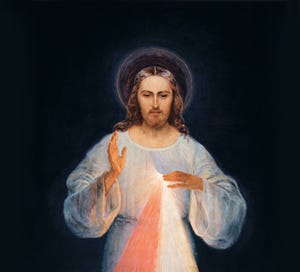
The Sunday after Easter is the final day in the Octave of Easter. It has a lot of names: Low Sunday, Domenica in albis — but it’s also known as Divine Mercy Sunday. The Divine Mercy devotion is relatively new, but it has grown in prominence in recent years.
So, what’s Divine Mercy Sunday all about? Here’s an explainer:
What’s the origin of Divine Mercy Sunday?
The Divine Mercy devotion originates in a series of apparitions in the 1930s, in which St. Maria Faustina Kowalska, an uneducated religious sister in Poland, recorded that Jesus appeared to her.
St. Faustina said that during the apparitions, which were later approved by the Church as worthy of belief, Jesus asked her to spread the message of his great mercy toward the world.
Pope John Paul II canonized St. Faustina on April 30, 2000. That same day, he also instituted Divine Mercy Sunday as a feast for the universal Church.
What exactly did Jesus tell St. Faustina?
The message St. Faustina received from Jesus is recounted in “The Diary of Saint Faustina.”
The central message is that Jesus desires to grant his great mercy to souls. He wants people to trust in his mercy, to ask for it, and to allow themselves to be vessels of his mercy for others.
There are several aspects to the devotion:
The “Image of Divine Mercy” is a painted depiction of Jesus as he appeared to St. Faustina. Jesus is clothed in white and raising his right hand in a gesture of blessing. Red and white rays are emitted from Jesus’ heart, signifying the blood and water that flowed from Christ’s heart at the crucifixion, and the sacraments of Baptism and Eucharist.
The Hour of Divine Mercy is 3 p.m., the time of Jesus’ death on the cross. St. Faustina recounted that Jesus asked people to pray and reflect on his Passion during this hour, and to ask for God’s mercy on the world. He promised that “In this hour, I will refuse nothing to the soul that makes a request of Me in virtue of My Passion.”
The Divine Mercy Chaplet is a prayer recited on rosary beads asking God to have mercy on the world. St. Faustina said Jesus promised great graces to be granted through the chaplet, particularly when prayed at the hour of death.
The Divine Mercy Novena is a nine-day series of prayers leading up to Divine Mercy Sunday and preparing for it. Each day invokes God’s mercy on a different group of souls, including priests, souls in purgatory, and those lukewarm in their faith.
Divine Mercy Sunday is celebrated on the Sunday following Easter. St. Faustina recorded that Jesus said he wants this feast to be “a refuge and a shelter for all souls, and especially for poor sinners.” On this feast, he promises that the depths of his mercy are available to humanity: “I pour out a whole ocean of graces upon those souls who approach the fount of My mercy.”
What are the promises attached to Divine Mercy Sunday? And how can I attain them?
St. Faustina said Jesus told her:
The soul that will go to Confession and receive Holy Communion [on Divine Mercy Sunday] shall obtain complete forgiveness of sins and punishment. On that day are opened all the divine floodgates through which graces flow.
Is this the same as a plenary indulgence?
Not quite. Plenary indulgences remove temporal punishment for sin - in other words, time in purgatory. A plenary indulgence requires an individual to go to confession, receive communion, pray for the pope’s intentions, and be completely detached from all sins - even venial sins. This last condition can be a tough one to achieve, and it means that people do not necessarily gain a plenary indulgence when they attempt to gain one.
The promises of Divine Mercy Sunday do not include the requirements of prayer and detachment from sin. They just require an individual to go to confession and receive communion.
Plenary indulgences are an incredible opportunity to experience God’s grace and mercy. Divine Mercy Sunday takes that opportunity one step further, making God’s mercy accessible to those who seek it, even if they have not achieved a perfect detachment from sin.
Additionally, a plenary indulgence can be gained for oneself or applied to a soul in purgatory. The graces promised in connection with Divine Mercy Sunday cannot be applied to another person.
Do I have to believe this?
No. Messages delivered through apparitions to saints fall into the category of “private revelation.” They are not doctrine or dogma, and Catholics are not required to believe them. The Church has approved the apparitions as worthy of belief, and Pope John Paul II has added Divine Mercy Sunday to the Universal Church calendar, but belief in the Divine Mercy apparitions and message are not required.







I really appreciate your explainers. They are really helpful as an adult convert to Catholicism. I especially liked the clarification about where this falls as a belief, dogma vs private revelation. Thanks!
Please read Catechism of the Catholic Church #1472 and #1473. Part of which reads ..”every sin, even venial, entails an unhealthy attachment to creatures, which must be purified her in earth, or after death called Purgatory.” “The forgiveness of sins and restoration of communion with God entail the remission of eternal punishment of sin, but temporal punishment of sin remains. “
“A conversion which proceeds from a fervent charity can attain the complete purification of the sinner in such a way that no punishment would remain.” Let’s pray for this.